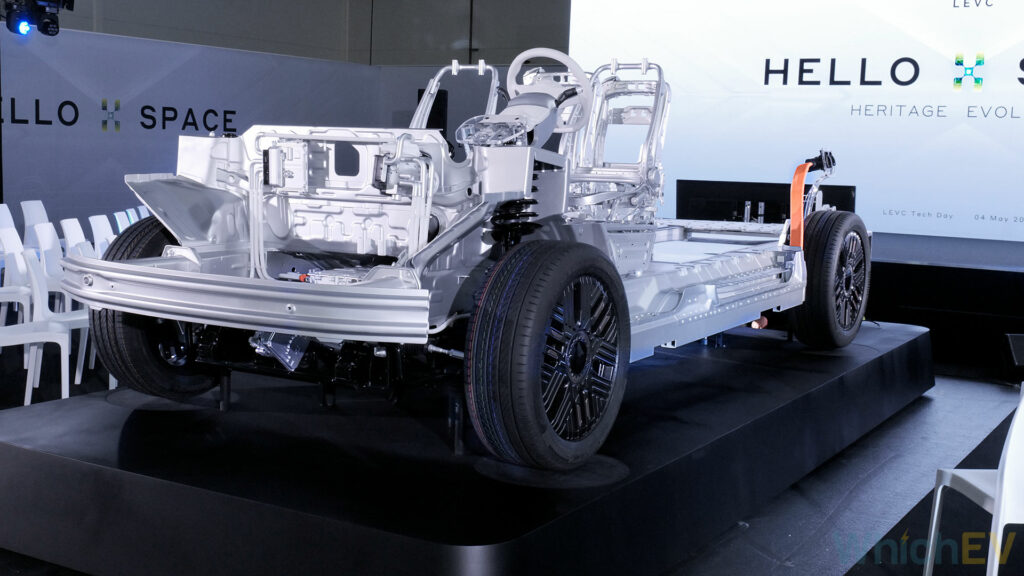London Electric Vehicle Company (LEVC) has unveiled its state-of-the-art, Space Oriented Architecture (SOA) platform – a modular and scalable platform for the development of electric vehicles that maximizes onboard space. The flexible platform has been developed in collaboration with parent company Geely and aims to deliver a range of smart, green, safe, and accessible mobility solutions for the world. SOA will support LEVC's transformation from a high-end taxi manufacturer to a provider of electric mobility solutions.
The new platform incorporates the latest electronic platform technology: L-OS, which provides a complete digital operating system, from autonomous capability to intelligent cockpits. LEVC's new platform marks a step-change in the expansion of its product line-up and will enable the company to enter new sectors.
SOA has been developed over the past two and a half years at R&D centres in China, Sweden, the UK, and Germany. This is the world's first EV platform that prioritises onboard space, with the goal of bringing interior-optimized zero-emission mobility to more consumers than ever before. LEVC says that the unprecedented flexibility of SOA makes it easier to create multiple seating and load-carrying configurations – making it easier to design/develop/deploy everything from passenger carrying vehicles to commercial models – offering significant advances in range, efficiency, safety, charging time, durability and connectivity. The safety angle will be crucial as we move closer to autonomous driving. The idea of hackable EVs is something that we all need to take seriously.
The platform's centrally-located battery delivers a fully flat floor, maximizing space for occupants, cargo or both. To this truly flat floor, SOA optimizes the packaging of electric powertrain components at the front, freeing up additional space for the driver and passenger. At the rear, SOA utilises an innovative rear suspension design that incorporates extra carrying capacity underneath the main luggage area, behind the rear axle.
SOA also raises the bar for interior flexibility, with multiple seating configurations and (relatively) endless possibilities. Interior space has been maximised to the extent that an extra row of seats can fit into the vehicle, compared to other vehicles in the same class. Multiple configurations are then enabled by a fully flexible seat arrangement, with a sliding track that runs from the front to the rear of the architecture.
SOA is configurable for a wide range of EVs, from spacious passenger-carrying models to cargo-optimized commercial applications. Supporting vehicle sizes from 4,860mm-5995mm in length and 1945mm-1998mm in width, with wheelbases from 3000mm-3800mm, SOA can also offer front-wheel-drive, rear-wheel-drive, and all-wheel-drive layouts. Equipped with a wide choice of state-of-the-art batteries from 73kWh to 120kWh, SOA has been designed to suit the individual needs of a customer. By combining space with long ranges (up to 430 miles/695km) and ultra-fast charging – SOA maximises convenience, with minimal downtime.
The SOA platform also incorporates Geely's L-OS, which provides a complete digital operating system from autonomous capability to intelligent cockpits. L-OS is a comprehensive, flexible, and open intelligent vehicle operating system that covers everything from intelligent cockpit displays to L4 autonomous driving. L-OS is capable of processing large amounts of data, providing intelligent interaction between humans and vehicles, and providing industry-leading levels of security. At this point, it's unclear what (if any) regulations/restrictions Western lawmakers will impose on driving technologies from China and other Eastern countries.
The launch of SOA marks a step-change in the expansion of LEVC's product line-up and will cement the company's position as a provider of advanced mobility solutions across the world. The platform's unprecedented optimisation of space will enable LEVC to meet – and exceed – the needs of global mobility customers, who have ever higher expectations for onboard comfort, cargo-carrying capability, and accessibility.
LEVC CEO Alex Nan, told media, “LEVC has entered the most exciting chapter in its history with the unveiling of our new innovative and highly flexible, space-focused, pure electric vehicle platform technology: Space Oriented Architecture.”
“SOA optimises onboard space offering multiple configurations and endless possibilities, a new advanced EV platform which supports LEVC’s new strategy to become a leading zero-carbon mobility provider. Combined with our groundbreaking L-OS digital architecture, it will bring our new mission to life, delivering smart, green, safe and accessible mobility to all, enabling us to transform from a high-end taxi manufacturer, launching LEVC into new sectors, with an extended range of state-of-the-art pure electric vehicles.”
“For LEVC, the concept of ‘mobility’ is not new. We have more than a century of ‘mobility’ in our DNA. The iconic vehicles this company has produced since 1908 may have changed over time, but the core principles have not: they have always been purpose-built for the city, focused on the best occupant experience. A spacious experience.”
“Building on LEVC’s unrivalled heritage in producing the iconic London black cab, we are adapting our business to meet the rapidly accelerating demand for spacious, flexible electric vehicles. Our rich history is combined with the resources of the Geely organisation to set our brand on an exciting new path, as LEVC today launches an adaptable architecture for an adapting world. With the combined strength of our new strategy and SOA, we will bring advanced zero-emission transportation to more customers than ever before”, he explained.
Geely has a good track record with vehicle architectures. It's ZEEKR initiative led to a pair of world records.
The architecture name and images released, really give you the impression that Geely is getting into lunar vehicle production. For now, that seems to be a simple coincidence. Will be interesting to see which company is awarded the China National Space Administration contract for their lunar rovers for their projects in 2030 and beyond.
